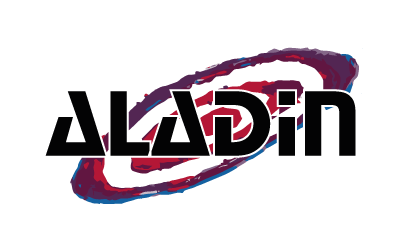An astronomical HiPS visualizer in the browser 
Aladin Lite is a Web application which enables HiPS visualization from the browser. It is developed at CDS, Strasbourg astronomical data center.
See A&A 578, A114 (2015) and IVOA HiPS Recommendation for more details about the HiPS standard.
Aladin Lite is built to be easily embeddable in any web page. It powers astronomical portals like ESASky, ESO Science Archive portal and ALMA Portal.
More details on Aladin Lite documentation page. A new API technical documentation is now available.
Aladin Lite v3 is out! Please play with Aladin Lite v3 at this link.
For integrating Aladin Lite into your personal website, please refer to this release page. Always prefer using the latest version. If you want the new features without minding about the bugs coming with it, then the beta is the good way to go.
There is a new in progress API documentation at this link. Editable examples showing the API can also be found here.
You can embed Aladin Lite it into your webpages in two ways
Please include the javascript script of Aladin Lite v3 into your project. API differences from the v2 are minimal, here is a snippet of code you can use to embed it into your webpages:
<!doctype html>
<html>
<head>
<!-- Mandatory when setting up Aladin Lite v3 for a smartphones/tablet usage -->
<meta name="viewport" content="width=device-width, height=device-height, initial-scale=1.0, user-scalable=no">
</head>
<body>
<div id="aladin-lite-div" style="width: 500px; height: 400px"></div>
<script type="text/javascript" src="https://aladin.cds.unistra.fr/AladinLite/api/v3/latest/aladin.js" charset="utf-8"></script>
<script type="text/javascript">
let aladin;
A.init.then(() => {
aladin = A.aladin('#aladin-lite-div', {fov: 360, projection: "AIT", cooFrame: 'equatorial', showCooGridControl: true, showSimbadPointerControl: true, showCooGrid: true});
});
</script>
</body>
</html>First, install it with npm:
npm i aladin-lite
Second, you can use it that way:
<!doctype html>
<html>
<head>
<!-- Mandatory when setting up Aladin Lite v3 for a smartphones/tablet usage -->
<meta name="viewport" content="width=device-width, height=device-height, initial-scale=1.0, user-scalable=no">
</head>
<body>
<div id="aladin-lite-div" style="width: 500px; height: 400px"></div>
<script type="module">
import A from 'aladin-lite';
A.init.then(() => {
let aladin = A.aladin('#aladin-lite-div', {fov: 360, projection: "AIT", cooFrame: 'equatorial', showCooGridControl: true, showSimbadPointerControl: true, showCooGrid: true});
});
</script>
</body>
</html>-
Rust/WebGL new core integration
-
Remove jQuery dep
-
UI dev, better support for smartphones
-
FITS images support
-
easy sharing of current « view »
-
support of all VOTable serializations (using votable.js?)
-
support of FITS tables?
-
creating HiPS instance from an URL
-
multiple mirrors handling for HiPS tile retrival
Source code is available in the src directory.
Aladin Lite is currently licensed under GPL v3.0
If you think this license might prevent you from using Aladin Lite in your pages/application/portal, please open an issue or contact us
There are several ways to contribute to Aladin Lite:
-
report a bug: anyone is welcome to open an issue to report a bug. Please make sure first the issue does not exist yet. Be as specific as possible, and provide if possible detailed instructions about how to reproduce the problem.
-
suggest a new feature: if you feel something is missing, check first if a similar feature request has not already been submitted in the open issues. If not, open a new issue, and give a detailed explanation of the feature you wish.
-
develop new features/provide code fixing bugs. As open development is a new thing for us, we will in a first time only take into consideration code contribution (i.e. Pull Requests) from our close partners. In any case, please get in touch before starting a major update or rewrite.
First you need to install the dependencies from the package.json Please run:
npm installAfter that you are supposed to have the Rust toolchain installed to compile the core project into WebAssembly. Follow the steps from the Rust official website here You will also need wasm-pack, a tool helping compiling rust into a proper .wasm file.
Once it's installed you will need to switch to the nightly rust version:
rustup default nightlyThen you can build the project:
npm run build- Make sure you have your wasm-pack version updated. To do so:
cargo install wasm-pack --version ~0.12- Make sure you are using the rust nightly toolchain
- Remove your
src/core/Cargo.lockfile andsrc/core/targetdirectory -- this ensures that you'd escape any bad compilation state:
git clean -di- then recompile with
npm run build.
It will generate the aladin lite compiled code into a dist/ directory located at the root of the repository. This directory contains two javascript files. aladin.umd.cjs follows the UMD module export convention and it is the one you can use for your project.
To run the examples, you can start a localhost server with the following command:
npm run serveFor just compiling the rust core, from the root location do:
cd src/core
cargo check --features webgl2and run the tests:
cd src/core
cargo test --features webgl2